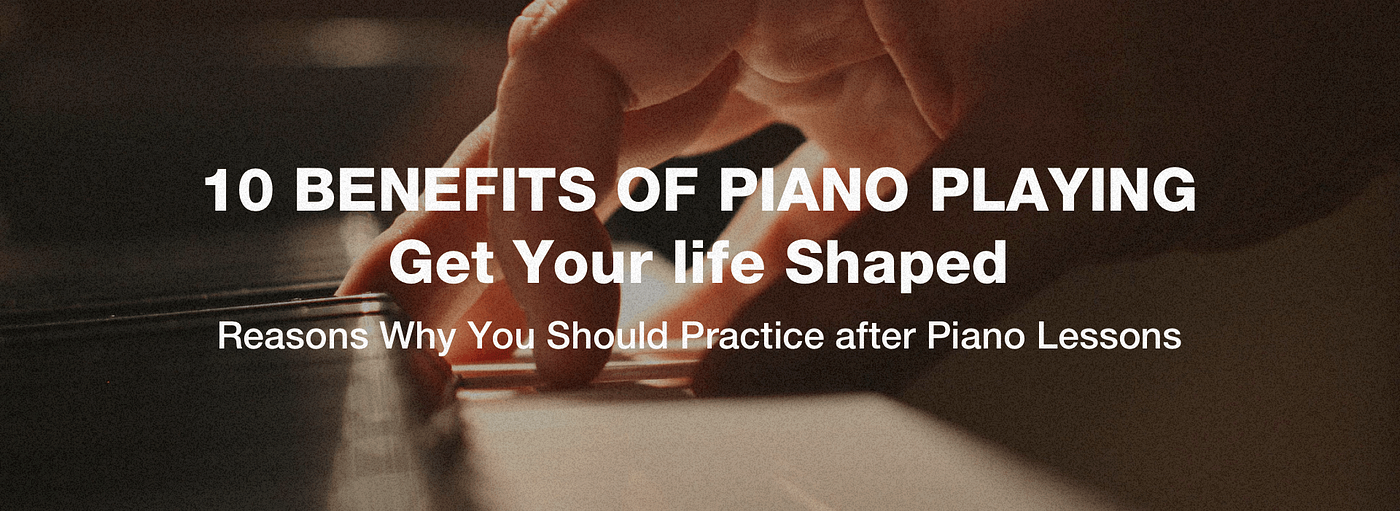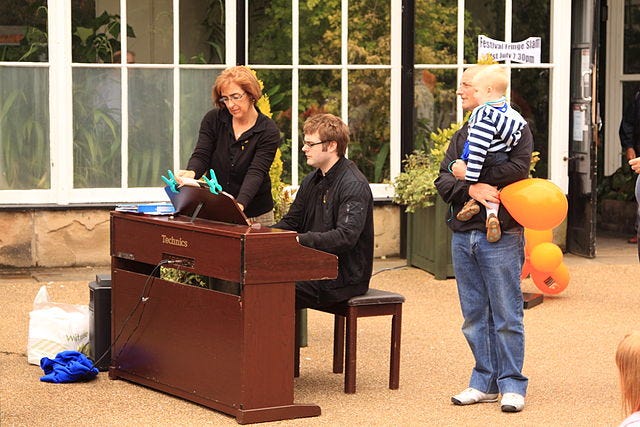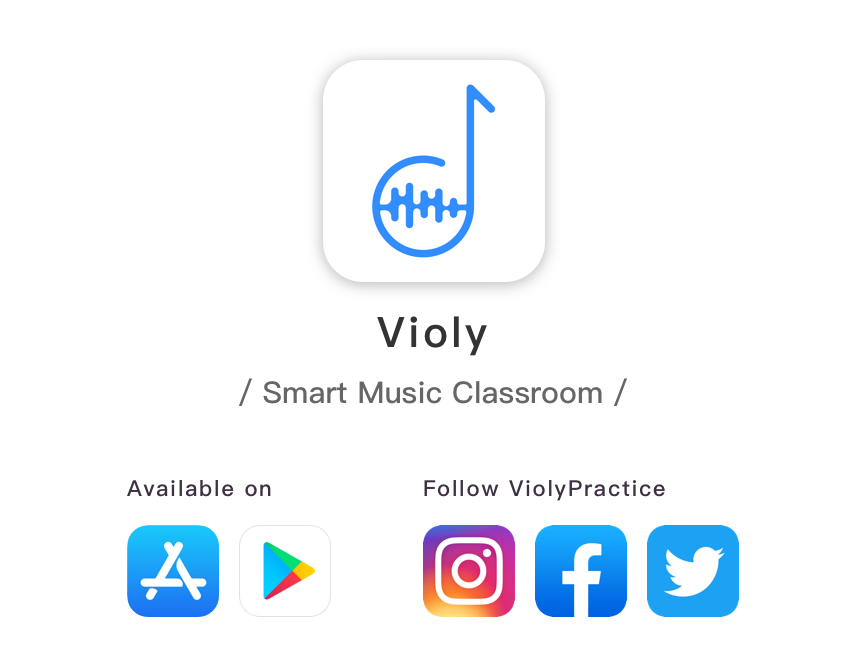Reasons Why You Should Practice after Piano Lessons
As long as you are learning piano and intend to master piano playing one day, you cannot skip daily practicing. It is true that effective practicing is one of the most important elements which can help piano students get improved step by step. But isn’t it tiresome for piano learners to be pushed to practice by their piano teachers and parents?
Apart from finding pleasure in piano learning, knowing the benefits of piano playing which are backed by science can also serve as an impetus for you to take the initiative to practice. The benefits can help shape your life, and you will never refuse to make your life better.

Piano Playing Relieves Stress
A moderate amount of stress can do good to you, while too much pressure can exhaust you. To keep yourself motivated, relieving stress by playing the piano can be a fantastic way.
An article published in 2013 by the National Library of Medicine found that piano practice can actually help alleviate stress in elderly adults. Despite the studied demographic being older adults, these findings are encouraging for people of all ages that playing the piano can improve mental health.
People who play the piano tend to experience less anxiety, loneliness, and depression than their nonmusical counterparts. Playing for a few minutes a day can improve your self-esteem, make you feel more positive, and lower your blood pressure. Piano playing is also a widely used form of therapy for Attention Deficit Disorder.
Piano Playing Improves Aural Awareness
If you are able to feel and understand music while listening to it, you may find that music can make difference to your life. To feel the music deeply, you need to improve your aural awareness.
Do you have a naturally musical ear, or are you tone deaf? Playing the piano can improve your overall aural awareness no matter where you fall in this range. Through piano playing, you are trained to recognize tones, intervals, and chords, and develop a sense of pitch.
Good aural awareness makes it easier to identify and understand various sound patterns, and can help you if you have trouble hearing when there is a lot of background noise. Also, the improvement of aural awareness provides a chance for piano learners to be more aware of the charm of music and the emotional feeling of others through voice tone changes.

Piano Playing Strengthens Hand Muscles & Hand-Eye Coordination
Good motor skills can not only make you more agile, but also bring you energy in some way. Piano playing requires asymmetrical motions of both hands and good hand-eye coordination, which makes it a helpful way to improve your motor skills.
A recent study on hand motor control in musicians suggests that piano performers have actually changed the cortical mapping to increase the speed of fingers. Playing the piano is like taking your fingers to the gym. As you practice on a regular basis, your fingers will inevitably strengthen. Yet the speed and the strength alone will not be the fingers’ greatest reward. Over time, your fingers will also become nimbler on the keys, and the repetitive motions of playing will increase your ability to coordinate the movements.
As a result, you will discover better what it means to “get a grip,” not just on the piano keyboard but on your life at large.
Piano Playing Helps Develop New Language Skills
It takes a long time for most people to learn a new language. The progress may be super fun, but unavoidably, challenging as well. New language skills can be improved in multiple ways, but have you ever known that piano playing can also help develop new language skills?
A study in the early 1990s discovered the “Mozart effect” in children, which showed that early language development and spatial-temporal intelligence could be boosted by piano lessons for preschoolers. Some of the auditory skills learned from piano playing enhance specific aspects of the perception of spoken language.

Learning a new language may present an opportunity for you to live a different lifestyle. It can be even more appealing if you can get familiar with an instrument at the same time.
Piano Playing Encourages Creativity
Whether you are a creative person or not, you are likely to have felt the wonder of creativity before. Every piano learner may be able to harness the creative power one day, since piano playing can encourage creativity.
Dr. Ana Pinho at the Karolinska Institute in Stockholm conducted a study on jazz pianists. By monitoring the piano players’ brain activity when they were playing, she found that the part of their brain responsible for default or stereotypical responses was actually turned off. Instead, during the jazz pianists’ playing, their improvisational ability was brought out to create unique, original sound and style.
It is always important to strengthen creativity, because it is the seed for new developments and new ideas which lead to a colorful life.

Piano Playing Teaches You Perseverance and Discipline
No matter what you are focusing on at present, perseverance and discipline are must-have qualities which can contribute to your achievements.
Learning new songs on the piano takes time and effort. Until you can actually play a song fluently by heart, you may need to spend several weeks practicing it. As you look forward to being able to play the song, you are supposed to stay motivated, learn patience, and increase your perseverance. These skills will always help you when you are confronted with difficult tasks at school, university, or work.
Practicing the piano regularly also requires discipline. Some parts of the piano song you are working on may be so technically challenging that you will have to practice over and over again. At the beginning, it cannot be easy for you. Maybe you have to come up with some little treats to get yourself there. However, slowly but surely, you will get used to it, and being disciplined about your practicing time will not be hard any more. Likewise, you can follow the same steps to get more control over your own life.
Piano Playing Sharpens Your Concentration
The rapid pace of life has transformed many people into multitaskers. The fact highlights the importance of concentration even more.
Split concentration is an integral part of playing the piano, which helps sharpen your concentration skills. When you are playing the piano, you are also multitasking that you have to focus on the rhythm, pitch, tempo, note duration, and several other things, which makes the process of piano playing a multi-level concentration exercise. Once you become adept at piano playing, you may find that your concentration skills in the outside world are also greatly improved.
In fact, studies have shown that every time a musician picks up his or her instrument, there are fireworks going on in his or her brain. Playing a musical instrument is perhaps the only activity during which almost all brain areas are simultaneously activated. What’s more, regular music practice at an early age can make structural changes to the brain that stay with you for the rest of your life, making your brain more efficient both while playing and in extra-musical endeavors.

Piano Playing Helps Improve Time Management & Organization Skills
Many of us have quite busy schedules. Unfortunately, scientists have not found a way to make one day last more than 24 hours yet. To get all your activities and duties done, you need to get them organized.
Piano playing can be particularly effective in challenging one’s ability to manage and organize their time since the mastery of piano techniques demands a routine practice schedule. Also, you have to understand how to schedule your practice sessions so that you can get the most benefit from them without feeling stressed when you are doing other things. For all piano learners, playing the piano is a great way to teach them the lifelong skills of time management.
It is always fascinating to spend your limited life participating in numerous interesting activities, but you can only manage to do so when you are able to organize your time well.
Piano Playing Enhances Your Physical Health
It is hard to say what is the fountain of youth on earth, but things which offer physical and physiological advantages can definitely play the role. Piano playing is supposed to be put on the list of these things, since it provides a plethora of health benefits that will supplement every part of your life.
A study by the University of Miami indicated that adults who play the piano in a regular basis experience increased levels of human growth hormone (HgH), which is responsible for cell reproduction and regeneration. This hormone also helps regulate body fluids, muscle and bone growth, metabolism, and perhaps even heart function. Besides, music has also been shown to reduce heart and respiratory rates, and to increase immune response.
Physical health is the basis of pursuing a life of development. As a piano player, you are fortunate to have a chance to enhance health while enjoying piano music.
Piano Playing Helps Expand Cultural Knowledge
Music is a language that crosses all barriers of age and ethnicity. Through learning and playing music, you are likely to meet new friends, experience new cultures, and even live a new life.
In a 2016 study of Amazonian women and men, musical preference was found to be strictly cultural and not hardwired into our brains. Counter to past assumptions about our brains’ preferences of dissonant versus consonant chords, the study’s findings support learning to play the piano as one way to expand our cultural knowledge of different sounds, styles and types of music. Especially for children, this exposure is critical to encouraging early open mindedness and cultural diversity.
Another wonderful thing about playing the piano is that you can share the music with other people. It is an amazing way to bring together larger communities, as well as smaller groups of family and friends.

After learning about the trivia above, you may have a clear idea about what you will gain from practicing after piano lessons. No matter how old you are, there are a whole lot of reasons for you to learn piano. When you are playing the instrument, the benefits you gradually obtain can shape your life bit by bit. Once you have noticed the changes in your life, you will thank yourself for choosing piano to accompany you all along.
Ref:
- https://www.pianoemporium.com/10-benefits-playing-piano/#:~:text=Regular%20piano%20playing%20offers%20different,pressure%20and%20increase%20immune%20response
- https://www.steinway.com/news/features/the-benefits-of-playing-piano
- https://www.lindebladpiano.com/blog/benefits-of-playing-piano
- https://www.flowkey.com/en/benefits-playing-piano
- https://www.pianodreamers.com/benefits-of-playing-piano/
- https://www.pianistmagazine.com/blogs/5-remarkable-health-benefits-of-playing-the-piano/
- https://www.edweek.org/leadership/music-on-the-mind/1998/04
- https://www.theguardian.com/science/2013/nov/12/scientists-creativity-pianists-brain-activity
Have a HAPPY practice!!
More Violy Music Articles:
How Should Music Parents Help Their Children’s Practice
Teaching Students to Read Key Signatures
A Comparison of Movable Do & Fixed Do
#ViolyPractice makes Perfect!!
Follow us on: Violy.app
